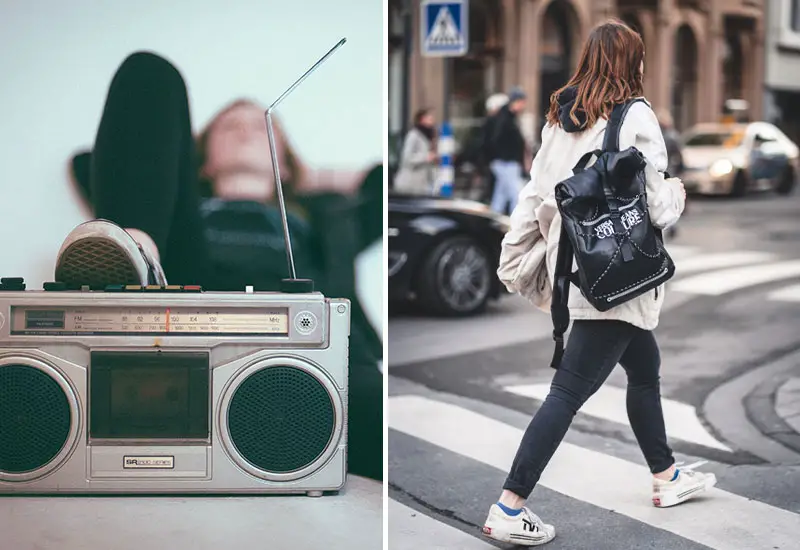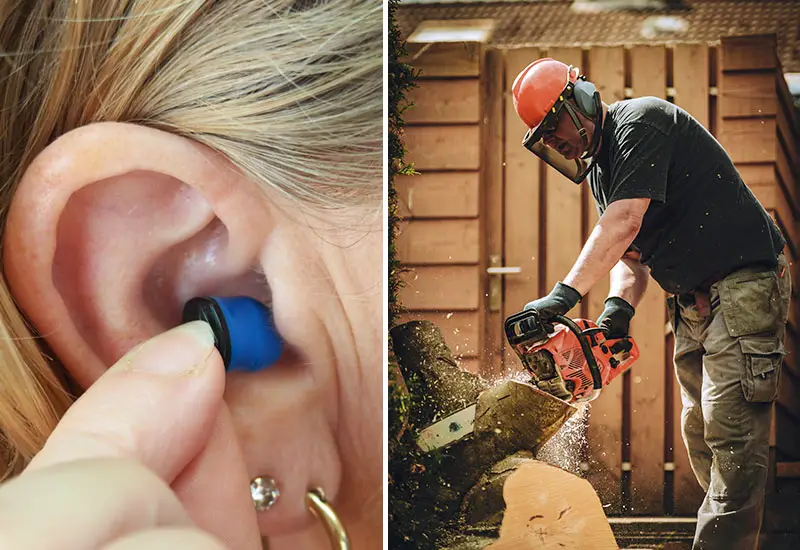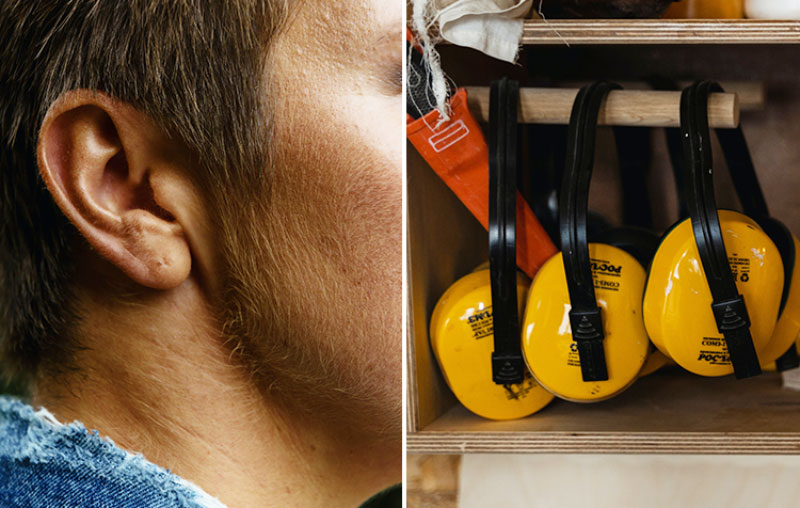Are you looking for the best tips for healthy ears and good hearing? Then you've come to the right place! Being able to hear well is one of the most important skills for coping with everyday life. It connects us with other people and enables us, for example, to take part in conversations, enjoy music and react to the sounds around us.
But not all of us have good hearing. In fact, around 19 percent of Germans over the age of 14 are affected by hearing impairment for a variety of reasons.1 Fortunately, there are usually a few things we can do ourselves to improve our hearing or, if possible, preserve it for a lifetime.
In this article, I would therefore like to introduce you to the best tips for healthy ears. Use them to make your own everyday life as ear-friendly as possible or simply to be able to hear better again. Let's go!
Advantages: Why is it important to be able to hear well?

Good hearing really does play a very important crucial role for our quality of life and our health.
Before we get straight to the tips for healthy ears, I would like to share something become more concrete and introduce you to some of the most important advantages that underline why it is so important to be able to hear well:
- Improved communication: Those who can hear well can also understand sounds or what is being said better, interact more effectively with other people socially and stay connected - and have more intensive relationships with them. A healthy hearing organ also automatically gives us confidence and sovereignty in conversation. This is also because misunderstandings are less likely to occur.
- Increased security: Naturally, good hearing is also a crucial safety factor in our lives, as we are better able to perceive acoustic warning signals and potential dangers in our surroundings and react more quickly.
- Greater learning ability and competence: Hearing well also means absorbing knowledge and information better. This is particularly important in the learning process for children, but is actually crucial for life and a professional career.
- Quality of life: The ability to make music, Sounds of nature and hearing the voices of our fellow human beings enriches our lives. It reduces our stress, provides us with orientation, increases our self-confidence and is the basis for a healthy lifestyle. More positive attitude to life.
10 tips: How can you preserve or improve your own hearing?

Our ears have the function, Pick up sound waves from the environment and convert them into impulses that reach the brain via the nerve pathways. Only then can we decide what to do with the information obtained.2
But Earache (e.g. on the eardrum or the external auditory canal) due to illness, inflammation, mechanical stimuli, continuous, intense noise or other influences can inhibit this function and ultimately also the overall quality of life. Age, medication, accidents and lifestyle also play a decisive role.
I would now like to show you exactly what you can do for healthy ears in your everyday life.
1. carry out regular hearing tests
To ensure the long-term health of your ears, regular hearing tests are essential. with ENT specialists or hearing aid acousticians essential - even if you don't currently have any ear problems.
As a rule, you will first be asked questions about your everyday life. This is to check whether you often surrounded by greater noise in your life are.
Your ears are then alternately connected to the so-called Tone audiometry different frequency ranges. This is followed by the Speech audiometry to test your ability to recognize spracks.3
The hearing test is absolutely painless, takes only a few minutes and can possibly secure you valuable quality of life for the rest of your life.
2. clean ears only when necessary and not with sharp objects
Our hearing organ is very sensitive. That's why you should Ear cleaning always do this carefully and not every day. The use of cotton buds or other sharp objects should be avoided as far as possible, as they pose a risk to your inner ear and eardrum and the Earwax only pushed further into the ear canal could become.
Instead, carefully use your little finger or simply have the plug (accumulated earwax) professionally removed. removed by an ENT doctor or ENT specialist.
3. support hearing through a healthy diet
A healthy, balanced diet is essential to maintain or improve your hearing. Our ears need certain nutrients to keep them functioning properly. These include above all Zinc, Magnesium, Potassium, as well as the Vitamins A, C and E.
Recommended foods for healthy ears or against hearing loss and other hearing problems therefore include Nuts, spinach, broccoli, lamb's lettuce, wholegrain products, dried apricots and also Bananas.
4. do listening exercises and train your ears
You heard right! The ability to hear (or the brain's ability to concentrate) can be trained with suitable exercises! For example, by in a loud voice Book reads or deliberately in the Forest bathing and consciously distinguish and assign all the sounds that come into your ear. In the end, the training effect depends primarily on your concentration.
By the way: Listening comprehension can also be practiced - for example, if you listen to a learn new language want. You can make this much easier for yourself by listening to podcasts and music (in the respective language, of course!), watching movies or generally not being afraid to ask questions in conversations for a better understanding.
5. use earplugs and hearing protection in noisy environments

No matter whether you work Construction site noise and read Sirens or at home from time to time with the Masonry drill into the wall with the Hammer nails into the garden shed or hammer wood with the Chainsaw cut: high noise exposure requires special protection for your ears.
To minimize the load and the prevent serious long-term effects of noise pollutionit is essential to wear special ear muffs or at least earplugs (depending on the situation) in noisy environments or during noisy activities.
Additional Tip: Those who are regularly exposed to cold weather (e.g. skiers) should also protect their ears, as bone growth in the ear canal is increased in cold weather and can cause problems. Earmuffs can help.
6. do not listen to music too loudly
Whether via speakers or headphones: You should also not turn up your favourite music too loud to minimize the risk of hearing impairment. The high sound pressure can damage the hair cells in your ears - especially if you expose your hearing organ to loud music very often.
Just listen to them at a slightly lower volume and prefer large over-ear headphones to small in-ear headphonesas they are much better at blocking out background noise. This often leads to the sound being turned up.
7. avoid noisy environments
It's not just protection against high noise levels that is important. If possible, you should use the (permanent) Avoid noise pollution in advance as far as possible.
In the immediate vicinity of Airports, concert halls or children's playgrounds or regularly live in Discotheques or on the Shooting range can damage your hearing in the long term. You should therefore spend as little time as possible in environments that are constantly or always noisy or keep the duration of exposure to a minimum.
8. lead a conscious lifestyle

A healthy lifestyle naturally also promotes your ear health. If you want to protect your hearing or hear better in general, you should, for example Ensure sufficient active exercise and drink plenty of fluids.
Also a Conscious stress compensation and reduction (e.g. through Meditation or yoga) and the Giving up cigarettes and alcohol, can make a decisive contribution to maintaining good hearing.
Tip: How you basically live more mindfulyou can find out more in the separate, linked article.
9. avoid multitasking and give your ears a break from time to time
Talking on the phone while the TV is on? Listening to the radio while talking to other people? Too many noises at once are stressful for the ears - and for the brain. Therefore, do your best to avoid bombarding your ears with lots of noise at the same time.
Our everyday lives are generally characterized by many different sources of noise. That's why you should listen to the Enjoy peace and quietto give your hearing organ a break from time to time. To do this, consciously take time every day for your mental regenerationif you want to promote your ear health.
10. take signs of poor hearing seriously
There are some physical symptoms that can indicate ear diseases or diseases related to the hearing organ. These include, for example Earache, itching in the ear, tinnitus, runny ears (watery, bloody or viscous fluid leaking from the ear) or Dizziness.
Also a Hearing loss is a typical distinguishing feature. You can recognize it, for example, by the fact that you have to ask more often during conversations because you have not understood something acoustically. Or the fact that you have to turn the TV up much louder than usual.
If the above symptoms occur, you should not hesitate for long and contact the ENT doctor or the ENT doctor you trust visit a hearing care professional. In this way, you can ultimately prevent long-term impairments and, if possible, hear well for the rest of your life.
Promoting ear health in a targeted and natural way

Always be aware that the health of your ears is very important for your general well-being - and that you can (usually) ensure good hearing yourself. This is another reason why ear protection and ear care should be an important part of your general health routine.
"Those who think they have no time for their health will sooner or later have to find time for illness."
Chinese proverb (more at Health Quotes)
I very much hope that I have been able to help you with this article. Do you have any questions, suggestions, tips or your own experiences on the subject of ear health that you would like to share? Then I look forward to your comment.
Stay healthy,

PS: Not only healthy ears, but also healthy eyes in a natural way. You can find out exactly how to do this next in the linked article.
- Deutscher Schwerhörigenbund e. V.: Statistics, available at https://www.schwerhoerigen-netz.de/statistiken. [25.11.2023]. ↩︎
- Foundation for Quality and Efficiency in Health Care: How does the ear work?, available at https://www.gesundheitsinformation.de/wie-funktioniert-das-ohr.html. [25.11.2023]. ↩︎
- Hörfreude Hörakustik GmbH & Co. KG: How does a hearing test work?, available at https://www.hoerfreude.de/de/hoertest/wie-funktioniert-ein-hoertest/wie-funktioniert-ein-hoertest.html. [25.11.2023]. ↩︎





